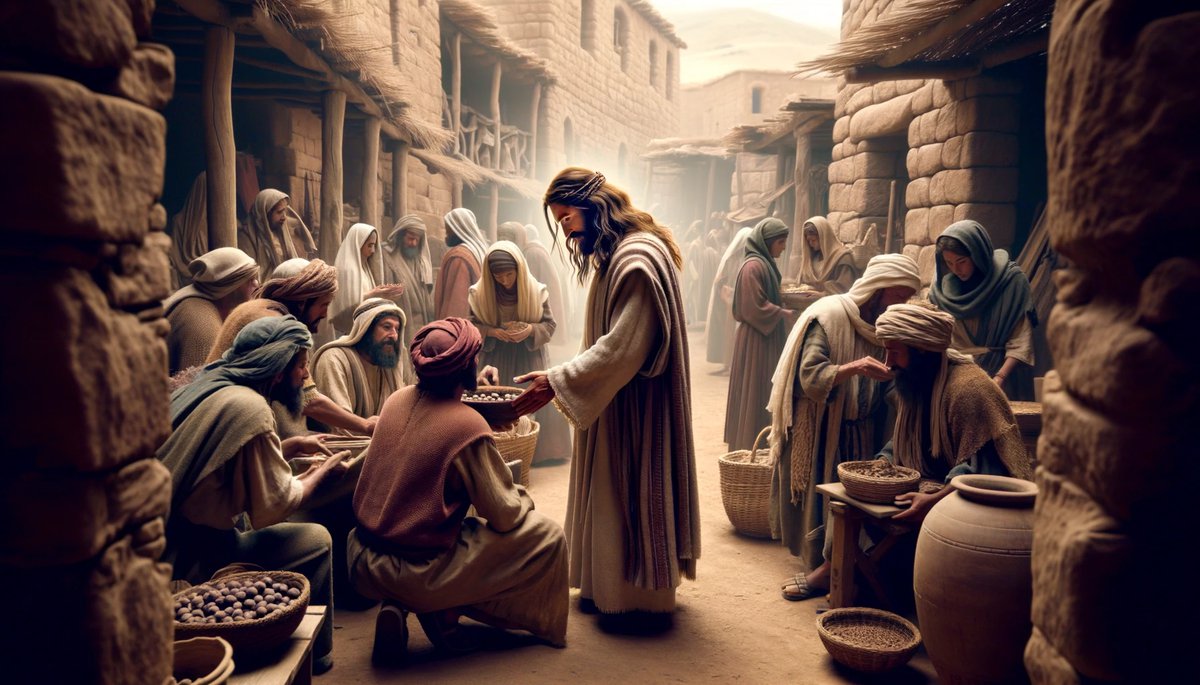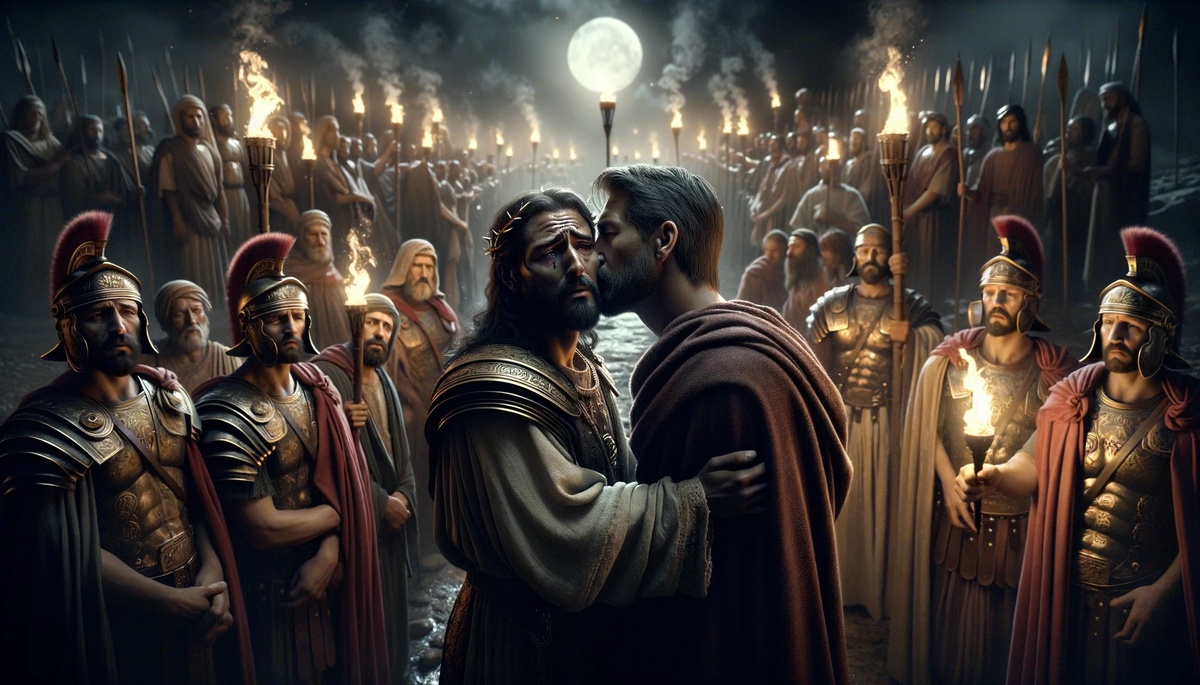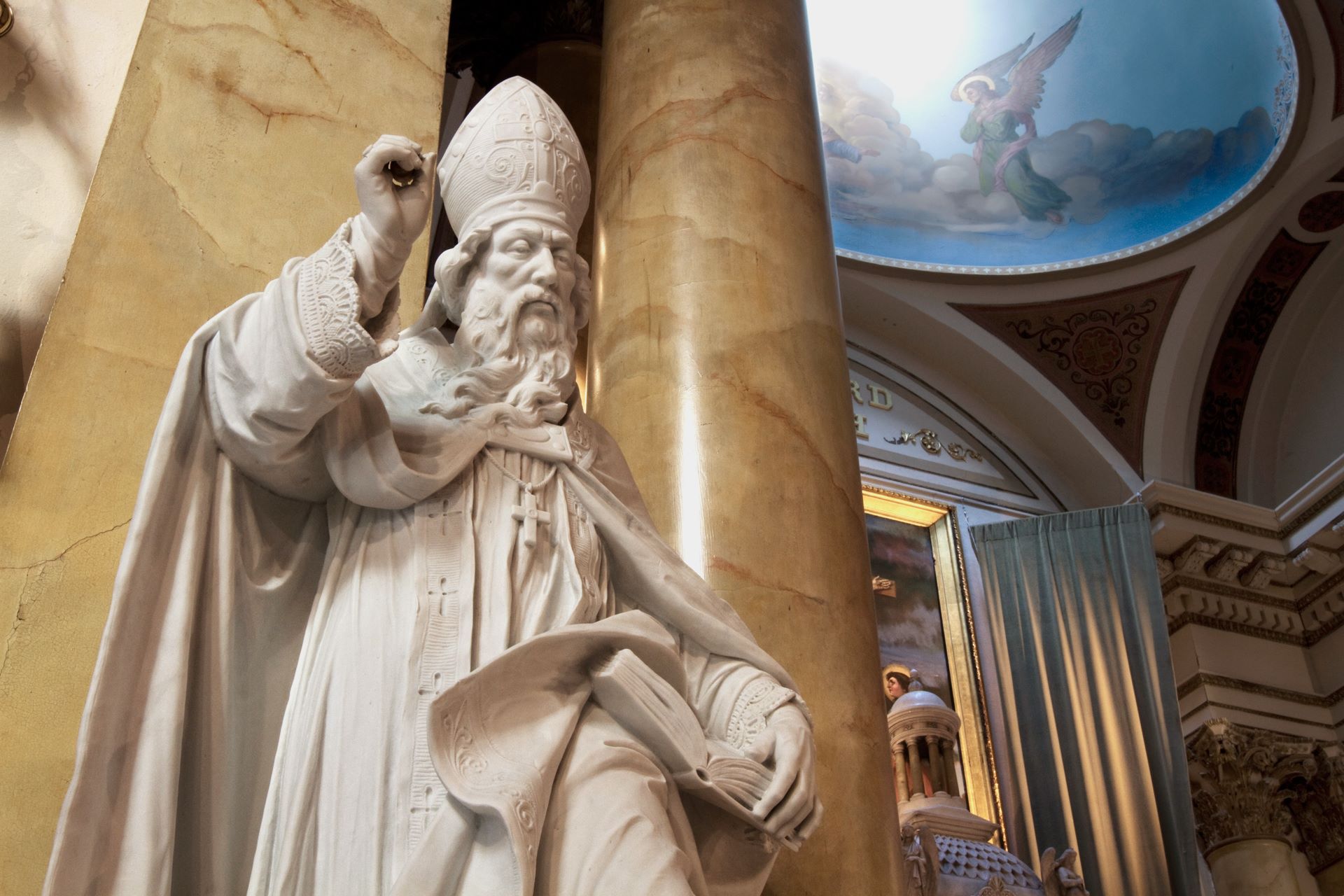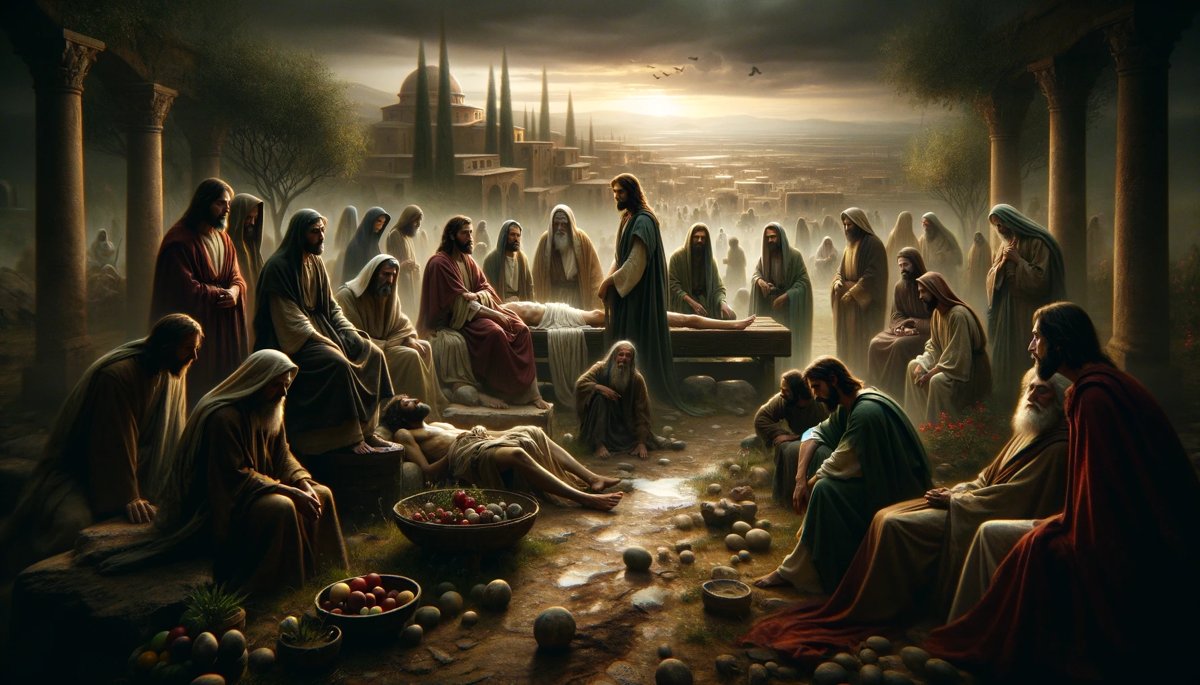Home>Christian Videos>Bible Stories>How Did Jesus Become The Christ?


Bible Stories
How Did Jesus Become The Christ?
Published: March 1, 2024
Jason DeRose, Managing Editor at Christian.net, uses his expertise in religion and journalism to deepen understanding of faith's societal impacts. His editorial leadership, coupled with a strong academic background, enriches the platform’s diverse content, earning him recognition in both journalism and religious circles.
Discover the biblical account of Jesus' journey to becoming the Christ in this insightful exploration of Bible stories. Uncover the transformative events that shaped his path to becoming the central figure of Christianity.
(Many of the links in this article redirect to a specific reviewed product. Your purchase of these products through affiliate links helps to generate commission for Christian.net, at no extra cost. Learn more)
Table of Contents
The Historical Context of Jesus' Life
During the time of Jesus, the region of Judea was under Roman rule, and the Jewish people were longing for a Messiah to deliver them from oppression. It was in this tumultuous historical context that Jesus of Nazareth emerged as a significant figure. He was born in Bethlehem and grew up in Nazareth, where he began his ministry around the age of 30. The Jewish society of that time was deeply rooted in religious traditions and expectations of a savior, which set the stage for Jesus' teachings and eventual recognition as the Christ. The historical context of Jesus' life, therefore, played a crucial role in shaping the narrative of his identity and mission.
-
Jewish Expectations: The Jewish people were anticipating the arrival of a Messiah who would restore the glory of Israel and free them from foreign domination. This widespread anticipation created a climate of fervent hope and longing for a deliverer, which Jesus would later address through his teachings and actions.
-
Roman Occupation: The oppressive rule of the Roman Empire weighed heavily on the Jewish population, fueling their desire for liberation. Jesus' message of spiritual freedom and the coming of the Kingdom of God resonated deeply with the people who sought relief from both physical and spiritual oppression.
-
Religious Landscape: The religious landscape of Judea was characterized by the influence of various sects such as the Pharisees, Sadducees, and Essenes, each with its own interpretations of Jewish law and messianic expectations. Jesus' interactions with these groups and his teachings within this diverse religious environment contributed to the shaping of his identity as the Christ.
-
Cultural Dynamics: The cultural dynamics of the time, including the blending of Jewish traditions with Hellenistic influences, created a complex backdrop for Jesus' ministry. His ability to communicate profound spiritual truths in a relatable manner within this cultural milieu further solidified his impact on the historical narrative.
In essence, the historical context of Jesus' life was marked by a convergence of religious, political, and cultural factors that set the stage for his emergence as a central figure in the fulfillment of Jewish messianic expectations. This context not only influenced the reception of Jesus' teachings and miracles but also laid the foundation for the early Christian community's understanding of him as the Christ.
Read more: How To Become Like Jesus Christ
The Teachings and Miracles of Jesus
Jesus' teachings and miracles were pivotal in shaping his identity as the Christ. His messages centered on love, compassion, and the coming of the Kingdom of God, challenging traditional religious norms and emphasizing the importance of spiritual transformation. Through his parables, such as the Good Samaritan and the Prodigal Son, Jesus conveyed profound truths about forgiveness, mercy, and the inclusive nature of God's love. His Sermon on the Mount, with its teachings on humility, peacemaking, and righteousness, continues to resonate as a timeless guide for ethical living.
The miracles performed by Jesus, including healing the sick, restoring sight to the blind, and even raising the dead, served as tangible demonstrations of his divine authority and compassion. These acts of supernatural power not only brought physical relief to the afflicted but also symbolized the arrival of God's Kingdom and the restoration of wholeness. The feeding of the five thousand and walking on water showcased Jesus' mastery over the natural elements, reinforcing the belief in his extraordinary nature.
Jesus' teachings and miracles were inseparable, forming a cohesive narrative of divine revelation and compassionate intervention. They not only validated his authority as a spiritual teacher but also sparked widespread awe and wonder among those who witnessed or heard about these extraordinary events. The profound impact of Jesus' teachings and miracles contributed significantly to the growing recognition of his unique role as the Christ, the long-awaited Messiah who would bring salvation and spiritual renewal to humanity.
-
Parables of Transformation: Jesus' use of parables to convey spiritual truths and challenge societal norms demonstrated his profound insight into human nature and the transformative power of divine love.
-
Miracles of Compassion: The miracles performed by Jesus were not merely displays of power but acts of compassion that revealed God's heart for the suffering and marginalized.
-
Demonstration of Divine Authority: Through his teachings and miracles, Jesus exhibited a divine authority that transcended human understanding, pointing to his identity as the Christ.
-
Impact on the Community: The teachings and miracles of Jesus sparked widespread curiosity and belief, drawing people from diverse backgrounds to witness the unfolding of God's redemptive plan.
In essence, the teachings and miracles of Jesus were integral to the establishment of his identity as the Christ, illuminating the path of spiritual enlightenment and affirming the fulfillment of ancient prophecies. These extraordinary manifestations of divine wisdom and power continue to inspire and captivate hearts, underscoring the timeless significance of Jesus' role as the embodiment of God's love and grace.
The Crucifixion and Resurrection
The pivotal events of Jesus' crucifixion and resurrection form the cornerstone of Christian faith and the understanding of Jesus as the Christ. The crucifixion, a brutal form of execution, was a harrowing ordeal that Jesus willingly endured, fulfilling the prophetic scriptures and demonstrating his sacrificial love for humanity. As he hung on the cross, Jesus uttered the profound words, "Father, forgive them, for they know not what they do," embodying the essence of compassion and forgiveness even in the face of unimaginable suffering. The crucifixion, though a moment of apparent defeat, marked the culmination of Jesus' earthly mission, paving the way for the transformative power of his resurrection.
The resurrection of Jesus from the dead, three days after his crucifixion, stands as a testament to his victory over sin and death. The empty tomb and the encounters with the risen Christ by his disciples and followers became the catalyst for a profound shift in their understanding of Jesus' identity. The resurrection validated Jesus' claims about his divine nature and solidified the belief in his role as the long-awaited Messiah. It also brought forth a message of hope and redemption, signaling the dawn of a new era in which death was conquered and eternal life was made accessible to all who believed.
-
Crucifixion as a Fulfillment of Prophecy: The events surrounding Jesus' crucifixion mirrored the prophetic scriptures, underscoring the divine orchestration of his redemptive mission and the fulfillment of ancient promises.
-
Resurrection as a Triumph over Death: The resurrection of Jesus shattered the finality of death, offering a profound revelation of God's power and the assurance of life beyond the grave.
-
Transformation of Disciples' Understanding: The resurrection transformed the despair of Jesus' followers into unwavering faith, igniting a movement that would eventually spread across the known world.
-
Eternal Significance of the Resurrection: The resurrection of Jesus holds eternal significance, offering the promise of new life and spiritual rebirth to all who embrace the message of redemption and grace.
In essence, the crucifixion and resurrection of Jesus were not merely historical events but profound manifestations of God's redemptive plan for humanity. These transformative occurrences not only solidified Jesus' identity as the Christ but also laid the foundation for the enduring message of salvation and eternal life through faith in him.
The Early Christian Community's Understanding of Jesus as the Christ
The early Christian community's understanding of Jesus as the Christ was shaped by a profound sense of revelation and transformation. Following the resurrection and ascension of Jesus, his disciples and followers experienced a radical shift in their perception of his identity. They came to recognize him not only as a revered teacher and miracle-worker but as the long-awaited Messiah whose life, death, and resurrection fulfilled the ancient prophecies of the Hebrew Scriptures.
-
Messianic Fulfillment: The early Christians, many of whom were Jewish, saw in Jesus the fulfillment of messianic promises that had been passed down through generations. The prophecies of a suffering servant in Isaiah and the anticipation of a triumphant king in the line of David converged in the person of Jesus, leading to a profound realization of his role as the Christ.
-
Spiritual Renewal: The transformative impact of Jesus' teachings and the indelible impression left by his resurrection brought about a spiritual renewal within the early Christian community. They began to perceive Jesus not only as a historical figure but as the embodiment of God's redemptive plan for humanity, ushering in a new covenant of grace and salvation.
-
Proclamation of the Gospel: Empowered by the outpouring of the Holy Spirit at Pentecost, the early Christians fervently proclaimed the message of Jesus as the Christ. They bore witness to his life, death, and resurrection, compelling others to embrace the profound truth of his identity and the promise of eternal life through faith in him.
-
Formation of Community: The understanding of Jesus as the Christ served as the cornerstone for the formation of a vibrant and devoted Christian community. This community, characterized by its unity, shared purpose, and unwavering faith, became a testament to the profound impact of Jesus' identity on the lives of those who embraced him as the Messiah.
-
Persecution and Endurance: In the face of persecution and opposition, the early Christian community's unwavering conviction in Jesus as the Christ became a source of strength and endurance. Their steadfast commitment to the truth of his identity, even in the midst of adversity, exemplified the depth of their understanding and belief in the transformative power of his life and teachings.
In essence, the early Christian community's understanding of Jesus as the Christ transcended mere acknowledgment of historical events; it encapsulated a profound spiritual awakening and a radical reorientation of their worldview. Their unwavering faith in Jesus as the fulfillment of divine promises laid the foundation for the enduring legacy of Christianity and its profound impact on the course of human history.















